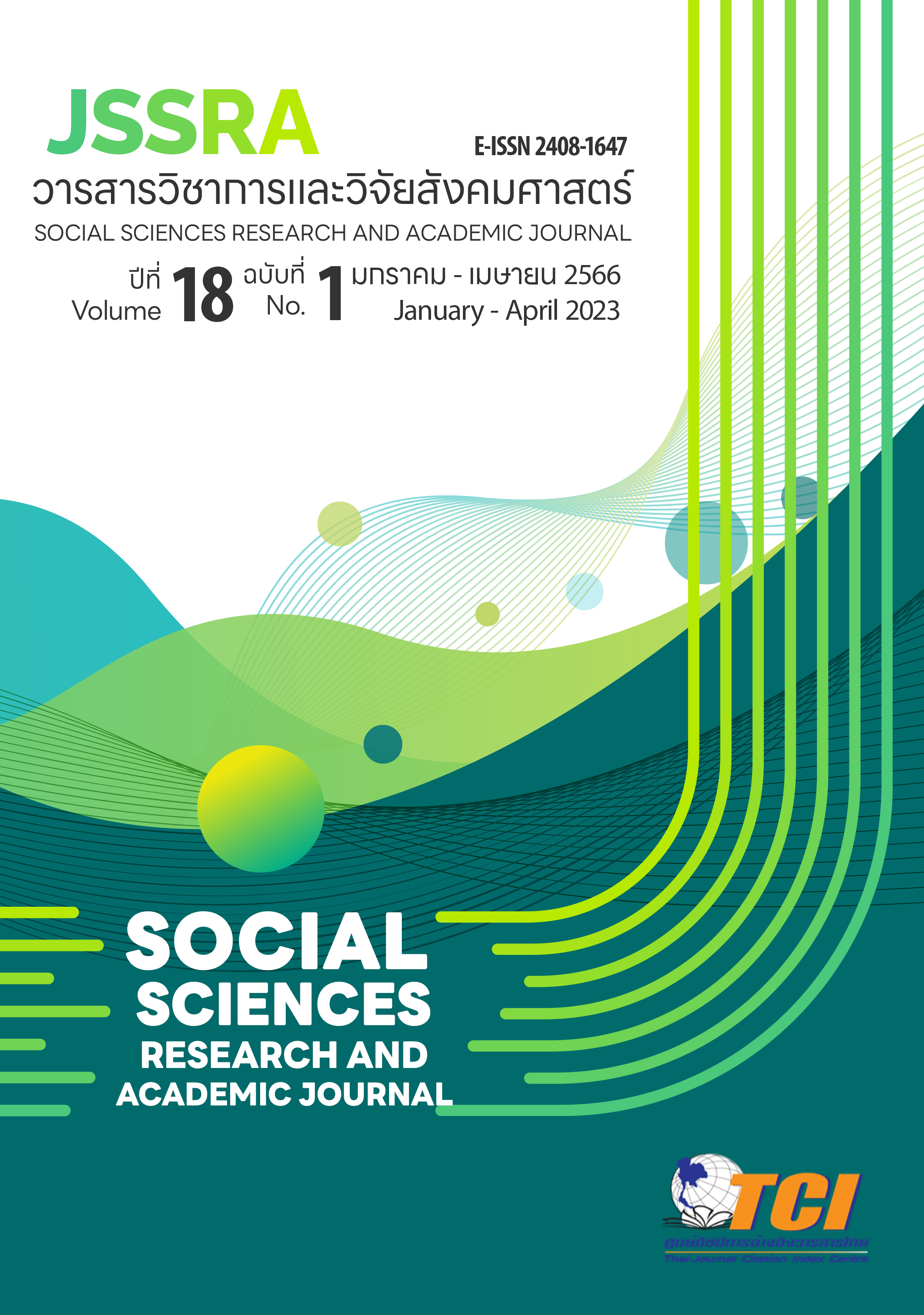The Development of Curriculum for Changing the Growth Mindset in English Communicative Teaching of English Teachers Based on Dweck’s Self-Theory
Main Article Content
Abstract
The objective of this study was to develop a curriculum for training English teachers to adopt a growth mindset in communicative English instruction based on Dweck’s Self-Theory. There were four stages of research: 1) studying the mindset of English teachers regarding English communicative teaching and the guideline for changing mindsets in English communicative teaching; 2) creating and checking the quality of the curriculum; 3) studying the outcomes of using this curriculum; and 4) evaluating and enhancing the curriculum. The research sample consisted of 12 primary school English teachers. The research instruments were The English communicative teaching assessment form that the index of item-objective congruence was at 0.60-1.00 and the reliability was at 0.924 and the English communicative teaching ability form that the index of item-objective Congruence was at 0.60-1.00 and the reliability was at 0.868. The experiment lasted for 60 hours. The statistics used for data analysis were (), (S.D.), t-test (One sample test), and content analysis for the qualitative data.
The research revealed that 1) The English teachers' mindset in English communicative teaching had an average score of 3.01, indicating a mix of growth and fixed mindsets, and that the process of Carol S. Dweck's Self-Theory should be used as a guideline for changing teachers' mindsets. The process of change should be modified to encompass all six mindset characteristics. 2) The curriculum had components: background, principles, objectives, structure, contents, activities, materials, and evaluation, 3) The results of the English teachers' mindset were more growth mindset and less fixed mindset after the implementation of the curriculum, and their scores on the ability to teach English communicatively based on a growth mindset were significantly, at the.01 level, higher than the criteria specified (70%), and 4) The results of evaluating for using the curriculum had an overall of the teachers’ opinions were at highest level, and improvement of the curriculum was the structure of time and a blended model.
Article Details
References
ชัยวัฒน์ สุทธิรัตน์. (2560). การพัฒนาหลักสูตร: ทฤษฎีสู่การปฏิบัติ. (พิมพ์ครั้งที่ 6). กรุงเทพฯ: สำนักพิมพ์ วี พรินท์.
มิลินทรา กวินกมลโรจน์. (2557). การวิจัยและพัฒนากระบวนการชี้แนะที่อิงทฤษฎีการเรียนรู้สู่การเปลี่ยนแปลงเพื่อปรับกรอบความคิดด้านการจัดการเรียนการสอนของครูประถมศึกษา. วิทยานิพนธ์ครุศาสตรดุษฎีบัณฑิต, จุฬาลงกรณ์มหาวิทยาลัย.
ธนะดี สุริยะจันทร์หอม, และ อารยา ปิยะกุล. (2561). ผลการใช้รูปแบบ SPASA เพื่อเสริมสร้างโกรว์ธ มายด์เซต สำหรับนักศึกษาหลักสูตรวิชาชีพครู. วารสารราชพฤกษ์, 16(3), 56-63.
บุญชม ศรีสะอาด. (2560). การวิจัยเบื้องต้น. (พิมพ์ครั้งที่ 10). กรุงเทพฯ: สุวีริยาสาส์น.
รัตนศิริ เข็มราช. (2558). การประเมินหลักสูตรการศึกษามหาบัณฑิต สาขาวิชาการสอนภาษาอังกฤษในฐานะเป็นภาษาโลก. รายงานการวิจัย คณะศึกษาศาสตร์ มหาวิทยาลัยบูรพา.
วาโร เพ็งสวัสดิ์. (2560). การพัฒนาหลักสูตรการฝึกอบรมการจัดการเรียนรู้แบบโครงงานของครูสอนภาษาอังกฤษระดับประถมศึกษา สังกัดสานักงานคณะกรรมการการศึกษาขั้นพื้นฐาน. วารสารบัณฑิตศึกษา มหาวิทยาลัยราชภัฏวไลยอลงกรณ์ ในพระบรมราชูปถัมภ์, 11 (3), 37-51.
วีรภัทร ไม้ไหว. (2559). การพัฒนาหลักสูตรฝึกอบรมครูเพื่อพัฒนาทักษะชีวิตของนักเรียนระดับประถมศึกษา สังกัดกรุงเทพมหานคร. วิทยานิพนธ์ กศ.ด., มหาวิทยาลัยธุรกิจบัณฑิต.
ศุทธินี ชวนไชยสิทธิ์ และกาญจนา ปราบพาล. (2552). การศึกษายุทธศาสตร์การสื่อสารภาษาอังกฤษ ของนิสิต มหาวิทยาลัยในประเทศไทย. สถาบันภาษาจุฬาลงกรณ์มหาวิทยาลัย.
สมบัติ คชสิทธิ์. (2560). การจัดการเรียนรู้ภาษาอังกฤษให้กับผู้เรียนยุค THAILAND 4.0. วารสารมนุษยศาสตร์และสังคมศาสตร์ วไลยอลงกรณ์ปริทัศน์, 7 (2), 175-186.
สถาบันทดสอบทางการศึกษาแห่งชาติ (องค์การมหาชน). (2560). รายงานผลการทดสอบทางการศึกษาระดับชาติขั้นพื้นฐาน (O-NET). สืบค้นเมื่อ 10 เมษายน 2562, จาก http://www.niets.or.th.
อริสรา ธนาปกิจ. (2555). คนไทยไร้ความกล้าส่งผลพูดภาษาอังกฤษรองบ๊วยโลก. เดลินิวส์.
Bridget Kilmer Mowbray. (2014). Transformation of Teacher Beliefs Regarding Intelligence Theory. Cardinal Stritch University, Milwaukee.
Brown, S., & Gillis, M. (1999). Using reflection thinking to develop personal philosophies. Journal of Nursing Education, 38(4), 171-175.
Dweck, C.S. (2006). Mindset: the new psychology of success. New York: Random House, Inc,.
Dweck, C.S. (2015). Carol Dweck Revisits the “Growth Mindset”. Education week, 35(5), 20-24.
Taba H. (1962). Curriculum Development: Theory and Practice. New York: Brace & World, INC.


